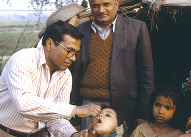

| Spring 2008 | |||||||||
| Current Issue | |||||||||
| A Family Affair A Global Solution for Diabetes Ecology and Public Health Building Public Health Capacity in India 'Big Picture' Thinking A Community of Scholars From the Dean In Brief Alumni News |
|||||||||
| Past Issues Other Publications Contact Us Make a Gift RSPH home |
|||||||||

|
|||||||||
Four physicians take on their nation's future as new fellows in the RSPH
By Robin Tricoles
The prevalence of polio, tuberculosis, and other infectious diseases, the dramatic increase in chronic diseases such as diabetes, and the growing need for routine health care have strained India's public health resources to the core. Singh is now part of a national effort to address these challenges through the Public Health Foundation of India (PHFI). Established in 2006 by the Indian government, the PHFI involves public and private partners intent on strengthening the nation's public health infrastructure through training, research, and policy development.
A top priority of phfi is expanding public health departments by establishing eight institutes of excellence to train thousands of public health professionals. The first three institutes are slated to open in 2008.
The institutes' faculty members will include physicians like Vivek Singh who complete the Future Faculty Program (FFP), a fellowship program to train health professionals for academic careers in PHFI institutes. Since 2006, more than 40 candidates have received fellowships for graduate programs in public health at 30 schools in the United States, Canada, Australia, and the United Kingdom. Collaborators include Harvard, Johns Hopkins, Cornell, Oxford, McGill, and the RSPH.
"When the foundation was formed, there were no public health schools in India," says RSPH Dean James Curran, who serves on the phfi governing board. "There are many opportunities for public health training and research in India, and the formation of these schools is integral to that process. The goal is to establish eight schools in five years."
Alka Singh is also among the four FFP fellows who will teach in India after completing degrees in the RSPH. A pediatrician who has studied and taught public health in India, Singh is using her FFP fellowship to gain the practical knowledge she felt she needed. She is now working toward a master's degree in global epidemiology.
"What I was bringing to the classroom was based on my clinical experience," she says. "I could talk about vaccinations and such, but I did not have management experience. I was going to the villages, I was meeting the population, I was working with public health workers, but none of it was very effective, and that was dissatisfying. I came here to learn and form new partnerships and collaborations so I can return to India and teach people who are already working in public health but need to be trained."
The FFP, through India's new institutes of excellence, "will make public health more broad based and not just limited to physicians," Singh adds. "For the first time, we will have experts in diverse fields coming together under one roof."
For Veena Murlidhar, a physician who worked as a medical officer at a busy urban health center, the FFP program has made it possible for her to study various health care systems. "There are many questions as to what type of care is needed in rural and urban India," says Murlidhar. "In rural areas, the volume of available health care is small compared to what is needed. And in urban areas we need more hospitals, ones that are affordable. But how do we make this happen?"
The professional ties that future faculty form with experts at the RSPH and other schools of public health will help strengthen India's public health system, Murlidhar notes. "These widespread connections give us an entire world's perspective, which we can use to make changes when we return to India."
Like Murlidhar, Ashish Rai is committed to improving India's public health system but with a different bent. "The way policies are formulated is very intriguing to me," says Rai, a pediatric neurologist and former research officer in the United Kingdom.
As a medical student, Rai often heard public health policies discussed in class, but his instructors rarely told how those policies were created. "I learned later that those making policy often don't have field experience," he says. "Instead, policies tend to be formulated by administrators, which isn't effective." Once back in India, Rai intends to change that by combining the knowledge he gains in the RSPH with his own field experiences as a physician.
After conducting polio surveillance in Bombay, Vivek Singh worked at a rural health center monitoring national health programs aimed at malaria, tuberculosis, and other infectious diseases. "It was the experience and interest that I gained at that time that led me to the Future Faculty Program," he says. "I'm grateful for the opportunities the program and the RSPH have provided me. I'm learning about standardized teaching methods and how a public health graduate program works."
More and more, Singh has also come to value interdisciplinary collaboration and research. "When I return to India, I want to emphasize how important they are to public health," he says. "I'm sure there will be a lot of great opportunities to improve public health in India. The key is developing good collaborations and proposals to generate grants that sustain our public health programs and research."
Current Issue | Past Issues | Contact Us | Make a Gift
Back to Top | RSPH home
© 2008. Emory University, All rights reserved.
Back to Top | RSPH home
© 2008. Emory University, All rights reserved.